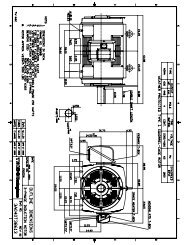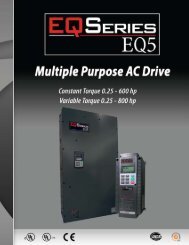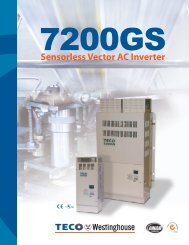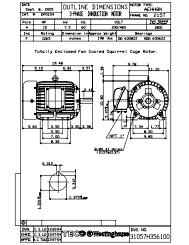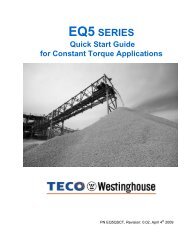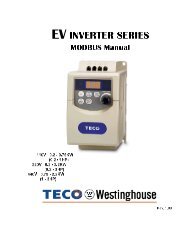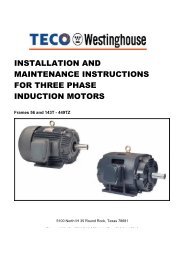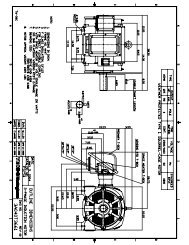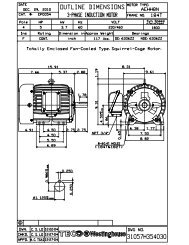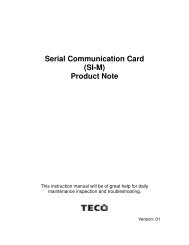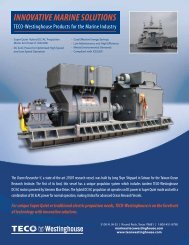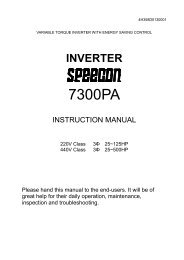EQ7 Series Instruction Manual - TECO-Westinghouse Motor Company
EQ7 Series Instruction Manual - TECO-Westinghouse Motor Company
EQ7 Series Instruction Manual - TECO-Westinghouse Motor Company
You also want an ePaper? Increase the reach of your titles
YUMPU automatically turns print PDFs into web optimized ePapers that Google loves.
[ 15 ] Inverter overload<br />
Problem Temperature inside inverter has risen abnormally.<br />
Possible Causes<br />
(1) Temperature around the<br />
inverter exceeded the<br />
inverter's specification<br />
range.<br />
(2) Excessive torque boost<br />
specified (F09*)<br />
(3) The specified acceleration/<br />
deceleration time was too<br />
short.<br />
What to Check and Suggested Measures<br />
Measure the temperature around the inverter.<br />
Lower the temperature (e.g., ventilate the panel where the inverter is<br />
mounted).<br />
Check whether decreasing the torque boost (F09*) does not stall the motor.<br />
If no stall occurs, decrease the F09* data.<br />
Recalculate the acceleration/deceleration torque and time needed for the load,<br />
based on the moment of inertia for the load and the acceleration/deceleration<br />
time.<br />
Increase the acceleration/deceleration time (F07, F08, E10 through E15, and<br />
H56).<br />
(4) Overload. Measure the output current.<br />
Reduce the load (e.g., Use the overload early warning (E34) and reduce the<br />
load before the overload protection is activated.). (In winter, the load tends to<br />
increase.).<br />
Decrease the motor sound (Carrier frequency) (F26).<br />
Enable overload prevention control (H70).<br />
(5) Ventilation paths are<br />
blocked.<br />
(6) Cooling fan's airflow volume<br />
decreased due to the<br />
service life expired or failure.<br />
(7) The wires to the motor are<br />
too long, causing a large<br />
leakage current from them.<br />
(8) Running on single-phase<br />
power<br />
[ 16 ] Overspeed<br />
Check if there is sufficient clearance around the inverter.<br />
Change the mounting place to ensure the clearance.<br />
Check if the heat sink is not clogged.<br />
Clean the heat sink.<br />
Check the cumulative run time of the cooling fan. Refer to Chapter 3, Section<br />
3.4.6 "Reading maintenance information – Menu #5 "Maintenance Information"."<br />
Replace the cooling fan.<br />
Visually check that the cooling fan rotates normally.<br />
Replace the cooling fan.<br />
Measure the leakage current.<br />
Insert an output circuit filter (OFL).<br />
Refer to Section 10.7 "If the Inverter is Running on Single-Phase Power," [ 1 ]<br />
and [ 6 ].<br />
Problem The motor rotates in an excessive speed (<strong>Motor</strong> speed (F03 data) (d32 data, d33 data) 1.2)<br />
Possible Causes<br />
(1) Incorrect setting of function<br />
code data.<br />
(2) Insufficient gain of the speed<br />
controller.<br />
(3) Noises superimposed on the<br />
PG wire.<br />
What to Check and Suggested Measures<br />
Check the motor parameter "Number of poles" (P01*).<br />
Specify the P01* data in accordance with the motor to be used.<br />
Check the maximum frequency setting (F03*).<br />
Specify the F03* data in accordance with the output frequency.<br />
Check the setting of speed limit function (d32 and d33).<br />
Disable the speed limit function (d32 and d33).<br />
Check whether the actual speed overshoots the commanded one in higher<br />
speed operation.<br />
Increase the speed controller gain (d03*.)<br />
(Depending on the situations, reconsider the setting of the filter constant or<br />
the integral time.)<br />
Check whether appropriate noise control measures have been implemented<br />
(e.g., correct grounding and routing of signal wires and main circuit wires).<br />
Implement noise control measures. For details, refer to the <strong>EQ7</strong> User's<br />
<strong>Manual</strong>, "Appendix A."<br />
10-18




